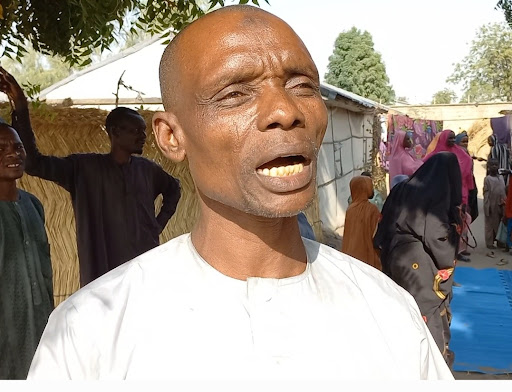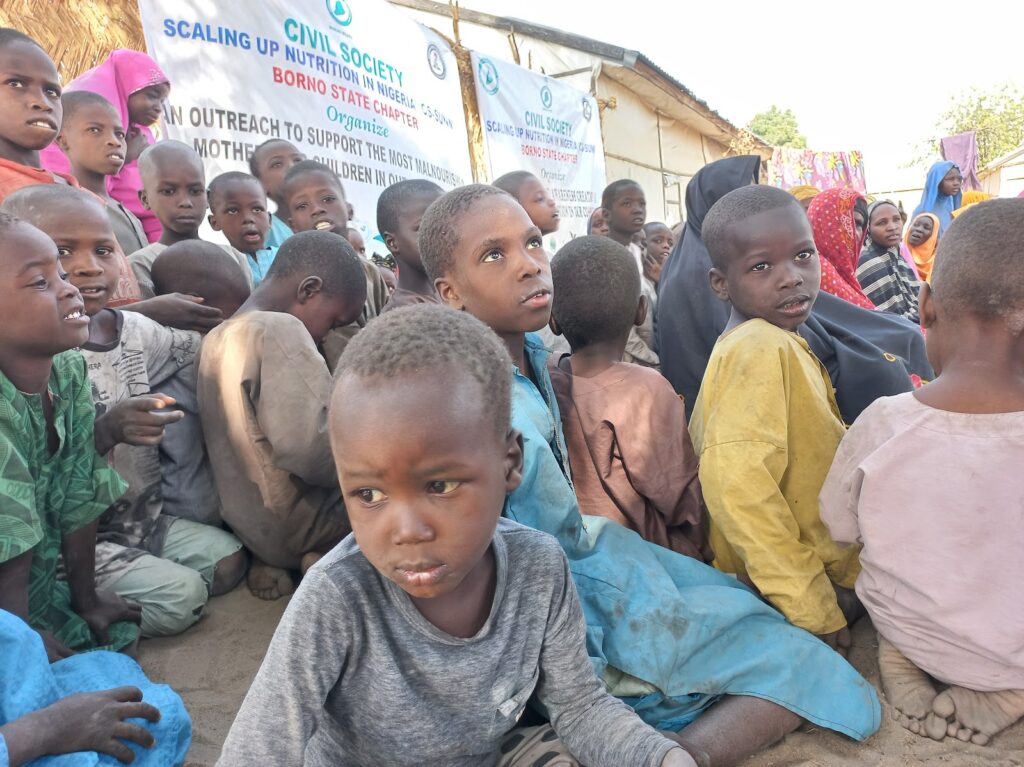Borno IDPs At Unregistered Camp Complain Of Neglect, Discrimination
There are hundreds of thousands of IDPs in Borno, Northeast Nigeria, but the vast majority are not in official camps recognised by the state authorities. Many of the displaced people at these informal camps face problems of hunger and lack of basic amenities.

The Fariya Buzu camp for internally displaced people (IDPs) has existed for over six years in Maiduguri, Borno’s capital. But the residents say they have never received support from government and non-governmental agencies.
Located behind the popular Maiduguri Cattle Market, the camp hosts about 3,000 people, mostly women and children. Many of them had fled their home communities in Marte Local Government Area (LGA) to escape Boko Haram hostility.
Ibrahim Tela, 51, one of the IDPs from Marte’s Kundli ward, said they were living a fulfilled life as farmers and cattle breeders before the terror group attacked in 2016.
“We have been in this camp for over six years now; and ever since our arrival, we have been surviving on our own,” he said.
Fariya Buzu camp is sited on a fenced undeveloped expanse of land that was once an orchard. The owner had donated it for the IDPs’ use. About eighty of the households at the camp live in tents made of tarpaulin and thatch grasses. The tarpaulin which has been weathered was provided by United Nations High Commission on Refugees (UNHCR) about six years ago when the IDPs arrived in Maiduguri.
“If you look around this camp you would notice that some of the tents and a few toilets bear the name of UNHCR; that was the first and last intervention we had in that regard,” said Ibrahim.
“The other thatch houses here in the camp were put up as a result of our effort as individuals to accommodate those who arrived here later on.
“Food, clean water, and access to medical health services have been a major challenge for us here. We hear stories of the Borno state government sharing food with people at other IDP camps, including the ones classified as unofficial, but no one looks towards our direction. We are IDPs from Marte, we are people of Borno, but we have been neglected for six years now.”
Ibrahim added that the major source of water is a public tap located near their camp, which only operates when there is electricity. Since the blackout occasioned by damage to electricity towers by the Islamic State West Africa Province (ISWAP) terror group, the IDPs have not had access to a steady water supply.

“All we need from the government since they cannot give us food, is to empower us with little startup token to enable us to do petty trading and we would be fine,” said Ibrahim, who used to be a trader and farmer back in Marte.
“Our men and women used to go to work for paid labour in people’s farms, but the earnings are too meagre to sustain an individual, much less a whole family.”
The women at the Fariya Buzu camp also shared their experience of abandonment.
Aisa-Mairam Ngubdo, a grandmother, said they found it difficult to make ends meet because members of the host communities often exploited them. Women often offered their labour to farm and home owners because of the need to get food for their families.
“But because we are seen as IDPs, the farm owners pay us lesser money with even threats that they can disengage us and get people who are willing to accept such amounts of money. Sometimes they pay us as low as N200 or N300 for a full day’s labour,” she said.
“We suffer so much every day and, if you ask for my candid opinion, I’ll say all we need is food. The children need it most.”

The problem of malnutrition, especially among women and children at the camp, has recently attracted the attention of Civil Society Scaling Up Nutrition in Nigeria (CS-SUNN), a non-governmental body that advocates better nutrition. CS-SUNN’s Borno branch said, not long ago, it visited the camp with locally made food supplements and distributed these to scores of affected children.
“Most of the children and even the women in the camp suffer different kinds of mild and severe malnutrition, which is clearly as a result of poor nutrition,” said Aisha Mandala, a nutritionist and head of CS-SUNN.
“It’s good that the media is now talking about this issue especially as they are common in unknown camps like Fariya Buzu. It was a sorry sight when we visited them some weeks ago; that’s why we initiated a dietary programme at the camp to see how we can improve nutrition using local ingredients to achieve our therapeutic supplements,” she said.
Marte is one of the locations in Northern Borno that were first occupied by Boko Haram around 2013. It is the seat of the Chad Basin Development Commission’s major irrigation farming project site, an area known for the mass production of wheat, rice, cabbage, beans, and vegetables.
Last year, the Borno state government commenced the process of returning IDPs to their original homes in the hinterlands after receiving clearance from the military that the areas are safe. The return programme, however, does not cover those IDPs at unregistered camps.
According to the records of the state government, there are 32 official IDP camps spread all over Borno with 16 of them in Maiduguri, the state capital. About 120,000 IDPs live in official camps within Maiduguri, while over 400,000 are spread across other garrison communities. The majority of the over 1.6 million people officially confirmed by the United Nations as displaced by the insurgency in Borno live in host communities and unregistered camps.
Support Our Journalism
There are millions of ordinary people affected by conflict in Africa whose stories are missing in the mainstream media. HumAngle is determined to tell those challenging and under-reported stories, hoping that the people impacted by these conflicts will find the safety and security they deserve.
To ensure that we continue to provide public service coverage, we have a small favour to ask you. We want you to be part of our journalistic endeavour by contributing a token to us.
Your donation will further promote a robust, free, and independent media.
Donate HereStay Closer To The Stories That Matter




